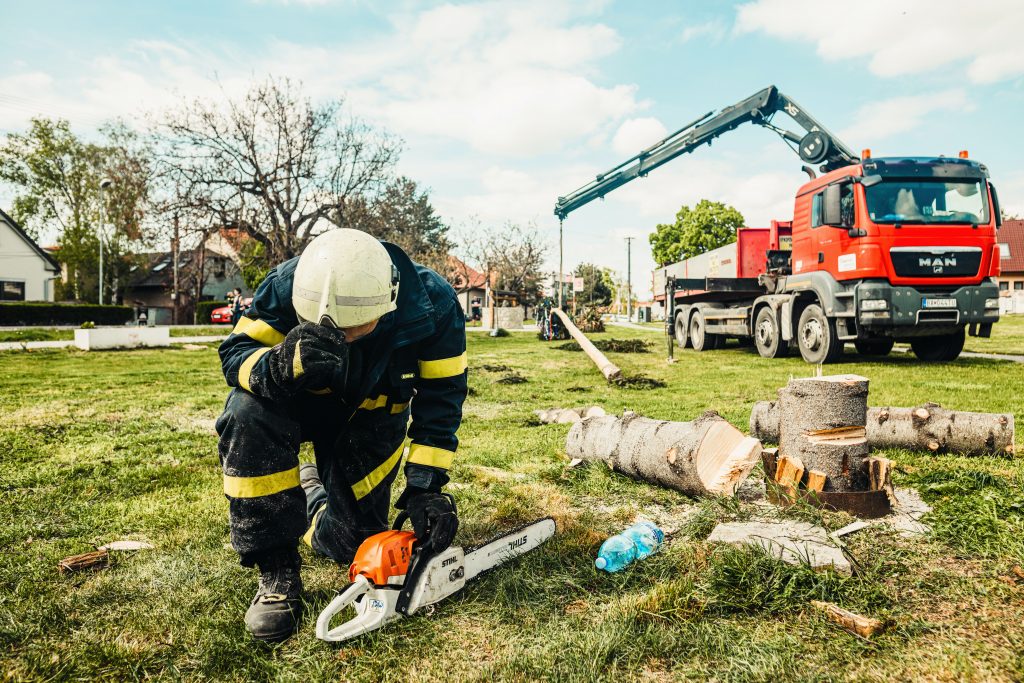The Benefits of Using a Certified Arborist for Tree Care
THE BENEFITS OF USING A CERTIFIED ARBORIST FOR TREE CARE
The topic “the benefits of using a certified arborist for tree care” delves into the advantages and reasons for hiring trained and certified professionals to care for trees. Certified arborists are experts in the field of arboriculture, possessing specialized knowledge, skills, and credentials that make them well-equipped to handle various aspects of tree care. This topic highlights why choosing a certified arborist over unqualified individuals or DIY approaches is essential for the health, safety, and longevity of trees.

Certified arborists are professionals who have obtained certification through recognized organizations after undergoing rigorous training and demonstrating their expertise in tree care and management. The benefits of using a certified arborist for tree care include:
1. Expertise and Knowledge: Certified arboristsWhat Education Do Tree Service Technicians Have? have comprehensive knowledge of tree biology, growth patterns, and species-specific care requirements. Their expertise allows them to accurately diagnose tree health issues, recommend appropriate treatments, and provide tailored care plans.
2. Safe and Professional Practices: Arborists prioritize safety during tree care operations. They are trained in using specialized equipment and techniques to minimize risks to themselves, property, and bystanders. This reduces the chances of accidents or injuries during tree care activities.
3. Proper Pruning and Trimming: Certified arborists have the skills to prune trees correctly, enhancing their structural integrity, aesthetics, and overall health. Improper pruning can lead to long-term damage, making it crucial to rely on trained professionals.
4. Tree Health Assessment: Arborists conduct thorough assessments of tree health, identifying diseases, pest infestations, and structural weaknesses. This early detection enables timely intervention to prevent the spread of problems and ensure the tree’s well-being.
5. Disease and Pest Management: Certified arborists possess knowledge of various tree ailments and effective treatment methods. They employ integrated pest management (IPM) strategies to minimize the use of chemicals and promote tree health.
6. Preservation and Conservation: Arborists are skilled in preserving mature trees, especially heritage specimens that hold cultural or historic significance. They implement strategies to extend the lifespan of trees and promote their vitality.
7. Planting and Species Selection: Certified arborists offer guidance on selecting the right tree species for specific site conditions. Proper planting techniques ensure the healthy establishment of new trees, reducing transplant shock and long-term stress.
8. Emergency Tree Care: In situations such as storm damage or hazardous tree conditions, certified arborists can respond quickly and effectively. Their expertise ensures that emergency tree careTree Care Services in Utah is carried out safely and with minimal further damage.
9. Economic and Environmental Impact: While hiring a certified arborist may have an upfront cost, their professional care can lead to long-term cost savings. Proper tree care reduces the risk of property damage, avoids unnecessary removals, and preserves property values. Additionally, healthy trees provide environmental benefits such as improved air quality, energy savings, and stormwater management.
10. Ethical Considerations: Hiring certified arborists reflects an ethical commitment to responsible tree care. Supporting qualified professionals contributes to the growth of a skilled workforce and the enhancement of the urban forest.
11. Industry Standards and Best Practices: Certified arborists adhere to industry standards and best practices established by recognized organizations. Their work aligns with ethical guidelines and ensures high-quality tree care.
In conclusion, using a certified arborist for tree care offers numerous benefits that ensure the health, safety, and vitality of trees in urban and natural environments. Their expertise, professionalism, and commitment to best practices make them valuable partners in maintaining and enhancing the urban forest while promoting sustainable and responsible tree care practices.
Importance of discussing the qualifications and advantages of hiring certified professionals

Discussing the qualifications and advantages of hiring certified professionals is crucial for promoting informed decision-making and responsible practices in various fields, including tree care, healthcare, engineering, and more. This discussion is essential because it helps individuals, businesses, and communities understand the significance of relying on experts with verified credentials and the benefits that come with hiring certified professionals. Here’s why it’s important to have these discussions:
1. Informed Decision-Making: When people are aware of the qualifications and advantages of hiring certified professionals, they can make more informed choices. They can assess their needs and choose professionals who have the necessary knowledge and skills to address those needs effectively.
2. Quality Assurance: Certification indicates that a professional has met specific standards of competency and expertise. Discussing these qualifications ensures that clients can expect a certain level of quality in the services provided by certified professionals.
3. Expertise and Specialization: Certified professionals have undergone rigorous training, education, and assessments in their respective fields. Discussing their qualifications highlights their specialized knowledge and expertise, which are critical for addressing complex issues and challenges.
4. Safety and Risk Management: Many professions involve potential risks, and hiring certified professionals mitigates those risks. Professionals with appropriate qualifications are more likely to adhere to safety protocols, reducing the likelihood of accidents, errors, or subpar work.
5. Regulatory Compliance: In some industries, certifications are required by law or industry regulations. Discussing these requirements helps individuals and organizations understand the legal and regulatory framework and ensures compliance.
6. Consumer Protection: Hiring certified professionals often comes with safeguards for consumers. Certified professionals are held accountable to ethical standards and codes of conduct, ensuring that consumers are treated fairly and professionally.
7. Complex Problem Solving: Certain problems and projects require specialized knowledge and problem-solving skills. Certified professionals possess the training and experience needed to navigate complex challenges effectively.
8. Long-Term Benefits: While hiring certified professionals may involve higher initial costs, the long-term benefits often outweigh the investment. Quality work and proper solutions reduce the need for rework, repairs, or further expenses down the line.
9. Professional Networks: Certified professionals are part of broader professional networks, which means they have access to the latest research, techniques, and industry developments. Clients benefit from this network through up-to-date and innovative solutions.
10. Confidence and Trust: Discussing the qualifications and advantages of hiring certified professionals builds confidence and trust among clients. They can be assured that they are working with professionals who are committed to their field and adhere to high standards of practice.
11. Industry Recognition: Certifications are often recognized by industry associations, peers, and stakeholders. Hiring certified professionals demonstrates a commitment to industry standards and best practices.
12. Encouraging Continuous Learning: Certification programs often require professionals to engage in ongoing education and training. Discussing these requirements encourages professionals to continuously update their skills and knowledge.
In conclusion, discussing the qualifications and advantages of hiring certified professionals is essential for promoting responsible choices, ensuring quality outcomes, and contributing to the overall professionalism and credibility of various industries.
These discussions empower individuals and organizations to make well-informed decisions that lead to positive outcomes and contribute to the advancement of their respective fields.
Understanding Certified Arborists
Understanding certified arborists involves gaining insights into the role, qualifications, and expertise of professionals who specialize in tree care and management. Certified arborists are trained and knowledgeable individuals who have earned certification from recognized organizations, demonstrating their proficiency in various aspects of arboriculture, tree health, and urban forestry. This certification signifies their commitment to best practices and their ability to provide knowledgeable and skilled tree care services. Here’s a comprehensive explanation of certified arborists:
1. Definition and Role: Certified arborists are professionals who specialize in the cultivation, management, and care of trees and woody plants. Their role encompasses a range of tree-related tasks, including planting, pruning, diagnosing and treating tree diseases, assessing tree health, and providing guidance on tree selection and maintenance.
2. Certification Process: To become a certified arborist, individuals typically need to meet specific criteria set by reputable organizations such as the International Society of Arboriculture (ISA). The process involves passing an examination that tests their knowledge in areas such as tree biology, safety practices, tree identification, proper pruning techniques, and more.
3. Educational Background: Certified arborists often have formal education in arboriculture, forestry, horticulture, or related fields. They undergo training that covers various aspects of tree care, including biology, soil science, pest management, and urban planning.
4. Experience Requirements: Certification programs often require candidates to have a certain amount of practical experience in the field. This hands-on experience ensures that certified arborists have practical skills and can apply their knowledge effectively.
5. Ongoing Education: Arboriculture is a dynamic field with advancements in techniques, research, and technology. Certified arborists are often required to engage in continuing education to stay up-to-date with the latest developments in tree care.
6. Expertise in Tree Care: Certified arborists have a deep understanding of tree biology, growth patterns, and health indicators. They can identify and diagnose various tree issues, from diseases and pests to structural weaknesses.
7. Proper Pruning and Maintenance: Arborists are trained in proper pruning techniques that enhance the health and structure of trees. They can trim trees to promote growth, remove dead or hazardous branches, and prevent over-pruning.
8. Tree Health Assessment: Certified arborists are skilled in assessing tree health and diagnosing problems. They can identify signs of disease, stress, or other issues that may impact the well-being of trees.
9. Planting and Selection: Arborists provide valuable guidance on selecting the right tree species for specific environments and purposes. They know how to ensure proper planting and establishment, reducing the risk of transplant shock.
10. Safety Measures: Safety is a paramount concern in arboriculture. Certified arborists are trained to prioritize safety during tree care operations, using proper equipment and techniques to protect themselves, property, and the surrounding environment.
11. Ethical Practices: Arborists adhere to a code of ethics that emphasizes responsible and sustainable tree care. They consider long-term tree health, ecosystem health, and the well-being of the community.
12. Professionalism: Certified arborists demonstrate professionalism in their interactions with clients, colleagues, and the community. They provide expert advice, communicate effectively, and uphold industry standards.
In essence, understanding certified arborists involves recognizing them as knowledgeable, trained professionals who play a crucial role in maintaining the health, safety, and vitality of trees in both urban and natural settings. Hiring a certified arborist ensures that tree care is conducted with expertise, ethics, and a commitment to best practices.

Comments are closed.